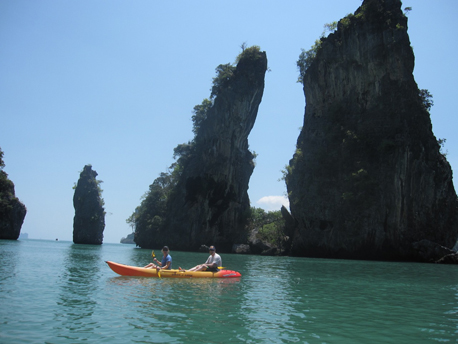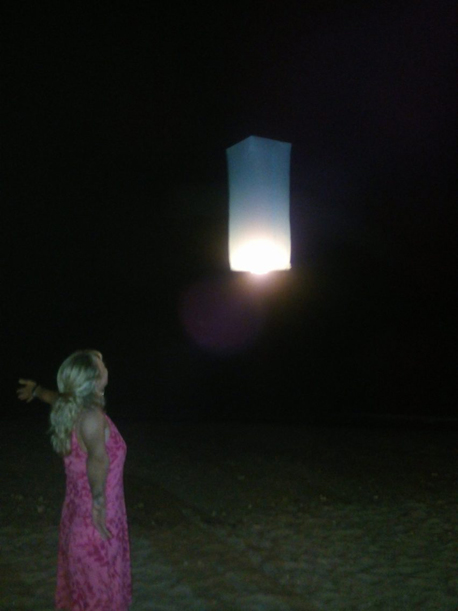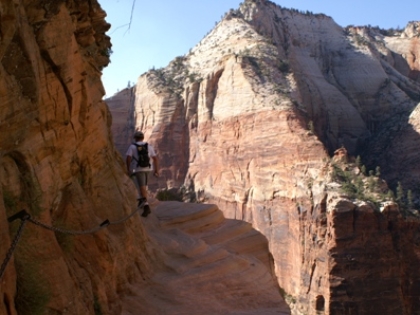While it’s still summertime, and some of us still have time for summer breaks or vacations left, here’s another reminder/insight that my book research has not taught me, but certainly has reinforced for me.
In searching for programs and professionals who help women of all ages discover, develop, or reconnect with their more authentic selves and voices, one of the common elements I’ve found in programs that seem particularly effective is, as one program director put it, “pressing PAUSE.” As in, pressing the pause button on our task-oriented daily lives and activities, and removing ourselves from the noise into a place where we can immerse ourselves in enough silence, space, and reflective time to hear what the voice of our innermost self might be trying to tell us. And that goes for men as well as women. We ALL need it, if we’re going to stay centered, grounded, and if we aspire to have our external lives remain aligned with what our internal selves value most.
A therapist talked about the importance of finding both time and a place of refuge to reflect. Pam Erickson, the director of a semester-long residential program for high school sophomores talked about the importance of pulling girls out of their routines into a place far enough away that they could get some perspective on their “normal” lives, and devote concerted time to figuring out what they wanted, as opposed to what everyone else (including culture and the media) expected of them.
It sounds so simple, and yet, go ahead. Just try to remember the last time you pulled it off. I interviewed a retired dean of Smith College who, when she was at Smith, developed a three-day retreat for seniors, to give them time to deeply reflect on how or how much their ideas of success, and their own goals, were a product of other people’s narratives and expectations for them, and to ponder how they might redefine those things for themselves. And when I asked her if she thought those workshops might be valuable to adult women, as well, she said, “Absolutely. I think it’s essential. But I think they wouldn’t have time.”
One of the reasons I always loved flying–and particularly flying solo–was that it forced me to take that time away from the noise. It put me in a cockpit, far above the ground, where–on most cross-country flights, anyway–there were big blocks of time where I had to keep a certain level of vigilance in monitoring instruments and course headings, but where I also had time to ponder, question, observe, and think. Especially because if you’re partly busy monitoring instruments, you can’t exactly dive into other distractions. You have to be present, but with spare mind space to contemplate. (I even wrote a column once about how similar this flying experience was to the practice of “mindfulness” that’s gaining popularity in psychological circles.)
Being a few thousand feet above the planet also forced me into a place where I got more of that perspective Pam Erickson was talking about. And she’s right. You see things, when you step away from your normal world, that you don’t notice every day. And you see other things differently, which is sometimes just as critical. What seems overwhelmingly important when we’re immersed in a situation can reveal itself to be not nearly as worth the time and energy … or not as important to us … when we get the chance to look at it from a little distance. And that goes for conflicts as well as priorities, goals, or just what we’re spending our time worrying about.
But how do you get all that if you’re not a pilot? My first thought is, we all could use some of those workshops Smith College offers its seniors. But until we get access to that, I found a reminder, in one of the research books I’ve read recently, of yet another benefit flying gave me, in terms of reflection and perspective: it took me to places that were different from the world I knew at home.
Dr. Sylvia Rimm is a developmental psychologist who focuses on how to get kids to achieve more successfully. But in her book See Jane Win, she recounted research she’d done on what helped women be both successful and happy. She surveyed 1,236 women between the ages of 29 and 85, who self-reported as both successful and happy. What were the factors that seemed to play a role in leading them to that happy, successful place? There were many factors, as you might imagine. But I found it interesting that the second-most positive experience the women listed in their development was travel, both with family and alone.
There are many ways to travel, of course. And going to a 5-star resort where you basically bring home with you is not as likely to yield any new revelations or perspective on your life at home–although, to be fair, it’s possible to have “aha” moments just from giving yourself the time to think and do nothing, even if it’s at a resort spa pool.
But getting out of your culture (which is entirely possible to do even within the 50 United States, but is even easier if you step outside of that), added to dedicated unplugged, disconnected downtime, can be profoundly revealing, in terms of re-setting your perspective.
I was reminded of this again a few months ago, when my husband and I ventured out to check off one of my big, long-time “bucket list” items: kayaking among the karsts of Thailand. (A karst, for those who didn’t grow up, like I did, reading their mom’s picture books on Thailand and Southeast Asia, is a limestone rock formation, created from erosion over time, that juts up dramatically from the water, typically covered with green plants that somehow find a foothold on those steep, jagged rock formations.)
 We stayed north of Phuket, just north of Khao Lak (where the 2005 tsunami wiped out virtually everything), and not far from the Khao Sok National Park. Yes, the karsts were amazing. But more important, the combination of downtime, the disconnection from electronics and communication from home (12 hours different in time zones), the peace and beauty of our surroundings, and even a little bit of immersion in a culture that goes about life very differently than we do in the U.S., allowed me to remember, once again, that some of the stuff we think is so important, here, isn’t maybe so important in the big picture/long run.
We stayed north of Phuket, just north of Khao Lak (where the 2005 tsunami wiped out virtually everything), and not far from the Khao Sok National Park. Yes, the karsts were amazing. But more important, the combination of downtime, the disconnection from electronics and communication from home (12 hours different in time zones), the peace and beauty of our surroundings, and even a little bit of immersion in a culture that goes about life very differently than we do in the U.S., allowed me to remember, once again, that some of the stuff we think is so important, here, isn’t maybe so important in the big picture/long run.
We value achievement so much here. Being in the middle of the buzz. Being known. Being successful in some externally rewarded or recognized way. But spend some time among people who’ve emigrated to Thailand for its slower, more beauty-and-experience-centered lifestyle, or sit in a very simple, beachside, local Thai restaurant and talk to some of the people who live and work there, and a very different value set emerges.
Not that I’m necessarily going to pull stakes and move to Thailand full-time, but seeing that different perspective is a reminder that the pressures I feel here are not the be all and end all truth and order of things. They’re just some markers we pay attention to–and probably way too much attention to–here. And even recognizing that helps to keep my focus aligned with a more rewarding and authentic life path; more centered on my own internal compass, instead of getting too caught up in the external noise and pressures of expectation.
After the first couple of nights at our hotel, we decided we much preferred the food and atmosphere at the simple, local restaurant on the sand, down the way from our hotel, than at the fancier restaurants in the area. We became regulars there, if only for a short time. And on our last night, we told our regular waiter, whose name (at least the one he used for tourists who didn’t speak Thai) was Tommy, that we were leaving the next day. He ran off and came back with a tissue-paper, rectangle box contraption he called a fire lantern. He explained that it was something that they gave to departing friends, to wish them luck and thanks for their friendship.
The lantern was a rectangle, with tissue paper across the top. At the bottom was a ring of solid fuel, positioned in the center of the rectangle, facing up, and attached to the tissue-paper lantern with strings to all four bottom corners. After we finished our meal, he went with us to the water’s edge, beyond the reach of the restaurant lights, where he lit the fuel. My husband and I held the edges of the lantern until the heat inside it increased enough that it lifted lightly out of our hands and climbed effortlessly into the starlit sky.
 In that moment, I was filled with both appreciation for the gift, and a bubbling-over sense of happiness, lightness and possibility. We reach upward. There is beauty in the world. Our stress points are often self-imposed. I thought of my uncle Ned, a gifted storyteller, teacher and astronomer, who died three years ago. I looked up at the stars over the Andaman Sea, and thought how much he loved them; how happy looking at them made him, and how passionate he remained about them, even when his career and personal aspirations faded. I watched our fire lantern rise toward them, and I wished him, wherever he is among them, luck, and thanked him for his love and friendship.
In that moment, I was filled with both appreciation for the gift, and a bubbling-over sense of happiness, lightness and possibility. We reach upward. There is beauty in the world. Our stress points are often self-imposed. I thought of my uncle Ned, a gifted storyteller, teacher and astronomer, who died three years ago. I looked up at the stars over the Andaman Sea, and thought how much he loved them; how happy looking at them made him, and how passionate he remained about them, even when his career and personal aspirations faded. I watched our fire lantern rise toward them, and I wished him, wherever he is among them, luck, and thanked him for his love and friendship.
It is incredibly difficult to find both the time and the space to press “pause” in our lives, quiet the noise, and find enough distance and change to allow us to reflect and gain perspective on the chaos we call daily life. But it is also incredibly important–especially if any of us want to stay grounded, hear the voice of our authentic selves, and pursue a life and path that doesn’t stray too far from its most important or cherished priorities, values … and yes, even starlit dreams.





